- Home
- David Brin
Existence
Existence Read online
To “Tether Joe” Carroll, who spins real space lariats …
and
“Doc” Sheldon Brown, who teaches time travelers …
… and Ralph Vicinanza, who helped many dreams and dreamers to thrive.
CONTENTS
Title Page
Dedication
Part One: Slings and Arrows
1. I, Amphorum
2. Aficionado
3. Sky Light
4. Resurrected City
5. Plunge
6. Fragrance
7. Getting Even
8. Reflection
Part Two: A Sea of Troubles
9. The Favor
10. Shoresteading
11. Newblesse Oblige
12. Apprenticeship
13. Metastable
14. Treasure
15. Artifact
Part Three: A Thousand Natural Shocks
16. Kindness of Strangers
17. More Than One
18. Povlovers
19. Time Capsule
20. Pursuit
21. The Tribe
22. Kindred Spirits
23. Warning
24. The World Watches
Part Four: Nobler in the Mind
25. Departure
26. Cooperation
27. Emissary
28. The Smart Mob
Part Five: A Consummation Devoutly Wished …
29. Incomprehension
30. The Avenue Within
31. Consensual Reality
32. Homecoming
33. Straight Flush
34. Seasteading
35. Sensing Destiny’s Call
36. False Diamonds
37. Archipelago
38. Upward Path
39. Tough Love
40. Waiting for Guidot
41. The Old Way
42. A Purpose
43. Sorry I Asked
44. Layered Reality
45. A Parrot Ox
46. A Smiling Face
47. The Infinite Chain
Part Six: This Mortal Coil
48. Reflex
49. Dour Storytellers
50. Divination
51. Inspiration
52. Appraisal
53. Potemkins
54. Dismemberment
55. Family Reunion
56. Eden
57. Ishmael
58. Desperation
59. Jonah
60. Shards of Space
61. It’s a Buoy
Part Seven: Sea of Troubles
62. Lurkers
63. A Crime Scene
64. Laminations
65. Lurkers
66. A Price for Continuity
67. Ancient Luminosity
68. Lurkers
69. A Sealed Room
70. Lurkers
71. Lurkers
72. Four Species of Human
73. Lurkers
74. A Cause Long Lost
75. Lurkers
76. Timing Is Everything
77. Lurkers
78. X Species
79. A Mother Lode
80. Lurkers
81. Explorers
82. Melancholy Lanes
83. Lurkers
84. Layers Under Layers
85. A Bestiary
86. Lurkers
87. Perchance to Dream
88. Lungfish
Part Eight: To Be …
89. Luminous
90. Transparency
91. Reflectivity
92. Opacity
93. Aberration
94. Refraction
95. Reflections
96. Focus
97. Images
98. Detection
99. Appreciation
Afterword
Follow-Up Resources
Acknowledgments
Tor Books by David Brin
Copyright
PART ONE
SLINGS AND ARROWS
Those who ignore the mistakes of the future are bound to make them.
—Joseph Miller
SPECIES
what matters? do i? or ai? + the question spins
+/- as my body spins !/+ in time to a chirping window-bird
“normal people” don’t think like this -/-/-
nor aspies -/- nor even most autistics
stop spinning! -/- there -/- now back to the holo-screen ->
rain smatters the clatter window —
bird is gone -/+ hiding from falling water + +
like i hide from a falling civilization
what matters then?/? progress? New minds??
after cortex, after libraries, the web, mesh, ai-grid
— what’s next ?/!
will it offer hope/doom for foolish humanity +/?
for the glaring cobbly minds +/?
or autistic-hybrids like me +/?
1.
I, AMPHORUM
The universe had two great halves.
A hemisphere of glittering stars surrounded Gerald on the right.
Blue-brown Earth took up the other side. Home, after this job was done. Cleaning the mess left by another generation.
Like a fetus in its sac, Gerald floated in a crystal shell, perched at the end of a long boom, some distance from the space station Endurance. Buffered from its throbbing pulse, this bubble was more space than station.
Here, he could focus on signals coming from a satellite hundreds of kilometers away. A long, narrow ribbon of whirling fiber, far overhead.
The bola. His lariat. His tool in an ongoing chore.
The bola is my arm.
The grabber is my hand.
Magnetic is the lever that I turn.
A planet is my fulcrum.
Most days, the little chant helped Gerald to focus on his job—that of a glorified garbageman. There are still people who envy me. Millions, down in that film of sea and cloud and shore.
Some would be looking up right now, as nightfall rushed faster than sound across teeming Sumatra. Twilight was the best time to glimpse this big old station. It made him feel connected with humanity every time Endurance crossed the terminator—whether dawn or dusk—knowing a few people still looked up.
Focus, Gerald. On the job.
Reaching out, extending his right arm fully along the line of his body, he tried again to adjust tension in that far-off, whirling cable, two thousand kilometers overhead, as if it were a languid extension of his own self.
And the cable replied. Feedback signals pulsed along Gerald’s neuro-sens suit … but they felt wrong.
My fault, Gerald realized. The orders he sent to the slender satellite were too rapid, too impatient. Nearby, little Hachi complained with a screech. The other occupant of this inflated chamber wasn’t happy.
“All right.” Gerald grimaced at the little figure, wearing its own neuro-sens outfit. “Don’t get your tail in a knot. I’ll fix it.”
Sometimes a monkey has more sense than a man.
Especially a man who looks so raggedy, Gerald thought. A chance glimpse of his reflection revealed how stained his elastic garment had become—from spilled drinks and maintenance fluids. His grizzled cheeks looked gaunt. Infested, even haunted, by bushy, unkempt eyebrows.
If I go home to Houston like this, the family won’t even let me in our house. Though, with all my accumulated flight pay …
Come on, focus!
Grimly, Gerald clicked down twice on his lower left premolar and three times on the right. His suit responded with another jolt of Slow Juice through a vein in his thigh. Coolness, a lassitude that should help clear thinking, spread through his body—
—and time seemed to crawl.
Feedback signals from the distant bola now had time t
o catch up. He felt more a part of the thirty kilometer strand, as it whirled ponderously in a higher orbit. Pulsing electric currents that throbbed up there were translated as a faint tingle down here, running from Gerald’s wrist, along his arm and shoulder, slanting across his back and then down to his left big toe, where they seemed to dig for leverage. When he pushed, the faraway cable-satellite responded, applying force against the planet’s magnetic field.
Tele-operation. In an era of ever more sophisticated artificial intelligence, some tasks still needed an old-fashioned human pilot. Even one who floated in a bubble, far below the real action.
Let’s increase the current a bit. To notch down our rate of turn. A tingle in his toe represented several hundred amps of electricity, spewing from one end of the whirling tether, increasing magnetic drag. The great cable rotated across the stars a bit slower.
Hachi—linked-in nearby—hooted querulously from his own web of support fibers. This was better, though the capuchin still needed convincing.
“Cut me some slack,” Gerald grumbled. “I know what I’m doing.”
The computer’s dynamical model agreed with Hachi, though. It still forecast no easy grab when the tether’s tip reached its brief rendezvous with … whatever piece of space junk lay in Gerald’s sights.
Another tooth-tap command, and night closed in around him more completely, simulating what he would see if he were up there, hundreds of klicks higher, at the tether’s speeding tip, where stars glittered more clearly. From that greater altitude, Earth seemed a much smaller disc, filling just a quarter of the sky.
Now, everything he heard, felt or saw came from the robotic cable. His lasso. A vine to swing upon, suspended from some distant constellation.
Once an ape … always an ape.
The tether became Gerald’s body. An electric tingle along his spine—a sleeting breeze—was the Van Allen radiation wind, caught in magnetic belts that made a lethal sizzle of the middle-orbit heights, from nine hundred kilometers all the way out to thirty thousand or so.
The Bermuda Triangle of outer space. No mere human could survive in that realm for more than an hour. The Apollo astronauts accumulated half of all their allotted radiation dosage during a few minutes sprinting across the belt, toward the relative calm and safety of the Moon. Expensive communications satellites suffered more damage just passing through those middle altitudes than they would in a decade, higher up in placid geosynchronous orbit.
Ever since that brief time of bold lunar missions—and the even-briefer Zheng He era—no astronaut had ventured beyond the radiation belt. Instead, they hunkered in safety, just above the atmosphere, while robots explored the solar system. This made Gerald the Far-Out Guy! With his bola for an arm, and the grabber for a hand, he reached beyond. Just a bit, into the maelstrom. No one else got as high.
Trawling for garbage.
“All right…,” he murmured. “Where are you…?”
Radar had the target pinpointed, about as well as machines could manage amid a crackling fog of charged particles. Position and trajectory kept jittering, evading a fix with slipperiness that seemed almost alive. Worse—though no one believed him—Gerald swore that orbits tended to shift in this creepy zone, by up to a few thousandths of a percent, translating into tens of meters. That could make a bola-snatch more artistic guesswork than physics. Computers still had lots to learn, before they took over this job from a couple of primates.
Hachi chirped excitedly.
“Yeah, I see it.” Gerald squinted, and optics at the tether-tip automatically magnified a glitter, just ahead. The target—probably some piece of space junk, left here by an earlier, wastrel generation. Part of an exploding Russian second stage, perhaps. Or a connector ring from an Apollo flight. Maybe one of those capsules filled with human ashes that used to get fired out here, willy-nilly, during the burial-in-space fad. Or else the remnants of some foolish weapon experiment. Space Command claimed to have all the garbage radar charted and imaged down to a dozen centimeters.
Gerald knew better.
Whatever this thing was, the time had come to bring it home before collision with other debris caused a cascade of secondary impacts—a runaway process that already forced weather and research satellites to be replaced or expensively armored.
Garbage collecting wasn’t exactly romantic. Then again, neither was Gerald. Far from the square-jawed, heroic image of a spaceman, he saw only a middle-aged disappointment, on the rare occasions that he looked in a mirror at all, a face lined from squinting in the sharp light of orbit, where sunrise came at you like a wall, every ninety minutes.
At least he was good at achieving a feat of imagination—that he really existed far above. That his true body spun out there, thousands of kilometers away.
The illusion felt perfect, at last. Gerald was the bola. Thirty kilometers of slender, conducting filament, whirling a slow turn every thirty minutes, or five times during each elongated orbit. At both ends of the pivoting tether were compact clusters of sensors (my eyes), cathode emitters (my muscles), and grabbers (my clutching hands), that felt more part of him, right now, than anything made of flesh. More real than the meaty parts he had been born with, now drifting in a cocoon far below, near the bulky, pitted space station. That distant human body seemed almost imaginary.
Like a hunter with his faithful dog, man and monkey grew silent during final approach, as if sound might spook the prey, glittering in their sights.
It’s got an odd shine, he thought, as telemetry showed the distance rapidly narrowing. Only a few kilometers now, till the complex dance of two orbits and the tether’s own, gyrating spin converged, like a fielder leaping to snatch a hurtling line drive. Like an acrobat, catching his partner in midair. After which …
… the bola’s natural spin would take over, clasping the seized piece of debris into its whirl, absorbing its old momentum and giving that property new values, new direction. Half a spin later, with this tether-tip at closest approach to Earth, the grabber would let go, hurling the debris backward, westward, and down to burn in the atmosphere.
The easy part. By then, Gerald would be sipping coffee in the station’s shielded crew lounge. Only now—
That’s no discarded second stage rocket, he pondered, studying the glimmer. It’s not a cargo faring, or shredded fuel tank, or urine-icicle, dumped by a manned mission. By now, Gerald knew how all kinds of normal junk reflected sunlight—from archaic launch vehicles and satellites to lost gloves and tools—each playing peekaboo tricks of shadow. But this thing …
Even the colors weren’t right. Too blue. Too many kinds of blue. And light levels remained so steady! As if the thing had no facets or flat surfaces. Hachi’s questioning hoot was low and worried. How can you make a firm grab, without knowing where the edges are?
As relative velocity ebbed toward zero, Gerald made adjustments by spewing electrons from cathode emitters at either cable end, creating torque against the planetary field, a trick for maneuvering without rockets or fuel. Ideal for a slow, patient job that had to be done on the cheap.
Now Hachi earned his keep. The little monkey stretched himself like a strand of spaghetti, smoothly taking over final corrections—his instincts honed by a million generations of swinging from jungle branches—while Gerald focused on the grab itself. There would be no second chance.
Slow and patient … except at the last, frenetic moment … when you wish you had something quicker to work with than magnetism. When you wish—
There it was, ahead. The Whatever.
Rushing toward rendezvous, the bola’s camera spied something glittery, vaguely oval in shape, gleaming with a pale blueness that pulsed like something eager.
Gerald’s hand was the grabber, turning a fielder’s mitt of splayed fingers, reaching as the object loomed suddenly.
Don’t flinch, he chided ancient intuitions while preparing to snatch whatever this hurtling thing might be.
Relax. It never hurts.
Only this
time—in a strange and puzzling way—it did.
A MYRIAD PATHS OF ENTROPY
Does the universe hate us? How many pitfalls lie ahead, waiting to shred our conceited molecule-clusters back into unthinking dust? Shall we count them?
Men and women always felt besieged. By monsters prowling the darkness. By their oppressive rulers, or violent neighbors, or capricious gods. Yet, didn’t they most often blame themselves? Bad times were viewed as punishment, brought on by wrong behavior. By unwise belief.
Today, our means of self-destruction seem myriad. (Though Pandora’s Cornucopia will try to list them all!) We modern folk snort at the superstitions of our ancestors. We know they could never really wreck the world, but we can! Zeus or Moloch could not match the destructive power of a nuclear missile exchange, or a dusting of plague bacilli, or some ecological travesty, or ruinous mismanagement of the intricate aiconomy.
Oh, we’re mighty. But are we so different from our forebears?
Won’t our calamity (when it comes) also be blamed on some arrogant mistake? A flaw in judgment? Some obstinate belief? Culpa nostra. Won’t it be the same old plaint, echoing across the ruin of our hopes?
“We never deserved it all! Our shining towers and golden fields. Our overflowing libraries and full bellies. Our long lives and overindulged children. Our happiness. Whether by God’s will or our own hand, we always expected it would come to this.
“To dust.”
—Pandora’s Cornucopia
2.
AFICIONADO
Meanwhile, far below, cameras stared across forbidden desert, monitoring disputed territory in a conflict so bitter, antagonists couldn’t agree what to call it.
One side named the struggle righteous war, with countless innocent lives in peril.
Their opponents claimed there were no victims, at all.
And so, suspicious cameras panned, alert for encroachment. Camouflaged atop hills or under highway culverts or innocuous stones, they probed for a hated adversary. And for some months the guardians succeeded, staving off incursions. Protecting sandy desolation.
Then, technology shifted advantages again.
The enemy’s first move? Take out those guarding eyes.
* * *
Infiltrators came at dawn, out of the rising sun—several hundred little machines, skimming low on whispering gusts. Each one, resembling a native hummingbird, followed a carefully scouted path toward its target, landing behind some camera or sensor, in its blind spot. It then unfolded wings that transformed into holo-displays, depicting perfect false images of the same desert scene to the guardian lens, without even a suspicious flicker. Other spy-machines sniffed out camouflaged seismic sensors and embraced them gently—cushioning to mask approaching tremors.

 The Practice Effect
The Practice Effect Infinity's Shore
Infinity's Shore Insistence of Vision
Insistence of Vision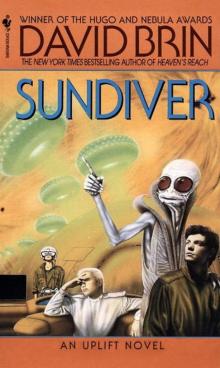 Sundiver
Sundiver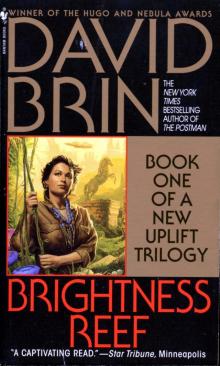 Brightness Reef
Brightness Reef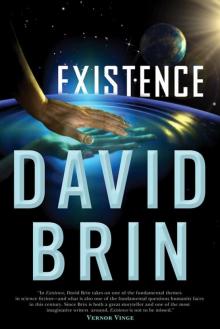 Existence
Existence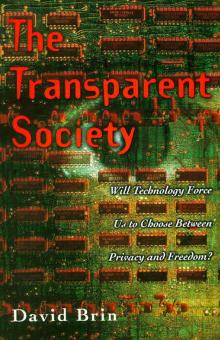 The Transparent Society
The Transparent Society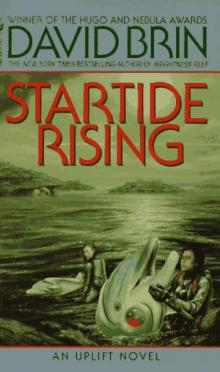 Startide Rising
Startide Rising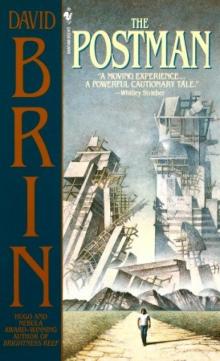 The Postman
The Postman The Uplift War
The Uplift War The Loom of Thessaly
The Loom of Thessaly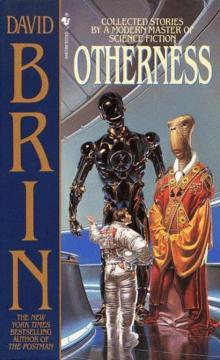 Otherness
Otherness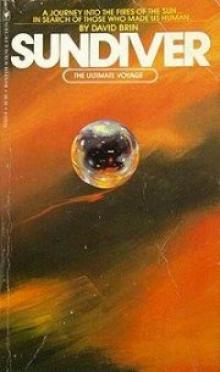 Sundiver u-1
Sundiver u-1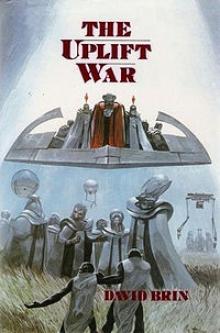 The Uplift War u-3
The Uplift War u-3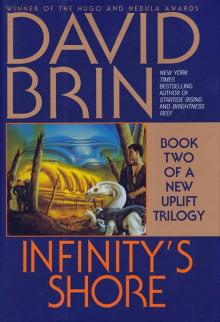 Infinity's Shore u-5
Infinity's Shore u-5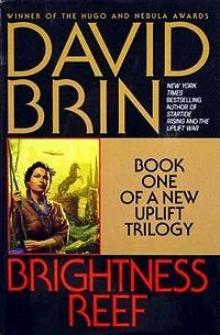 Brightness Reef u-4
Brightness Reef u-4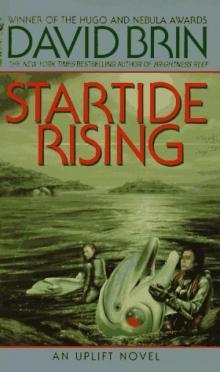 Uplift 2 - Startide Rising
Uplift 2 - Startide Rising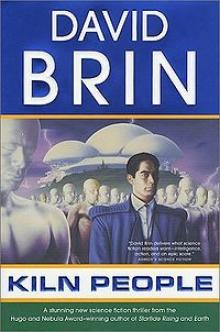 Kiln People
Kiln People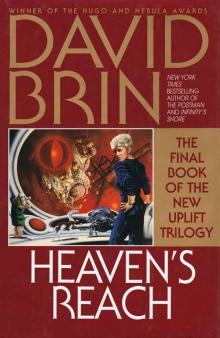 Heaven's Reach u-6
Heaven's Reach u-6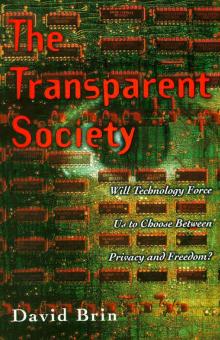 The Transparent Society: Will Technology Force Us to Choose Between Privacy and Freedom?
The Transparent Society: Will Technology Force Us to Choose Between Privacy and Freedom?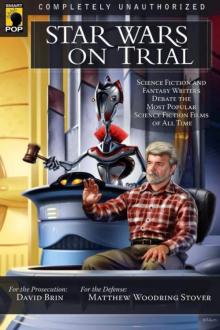 Star Wars on Trial
Star Wars on Trial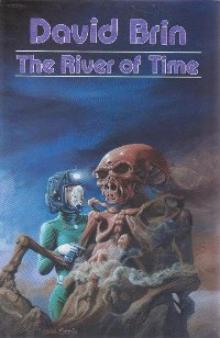 Lungfish
Lungfish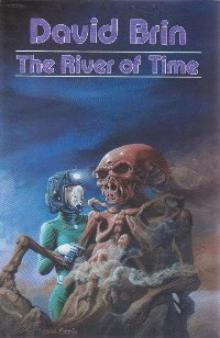 Tank Farm Dynamo
Tank Farm Dynamo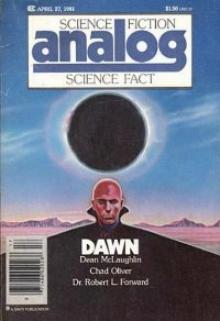 Just a Hint
Just a Hint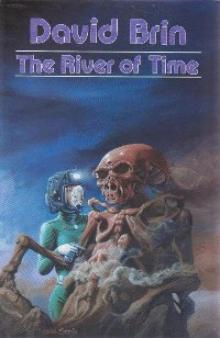 A Stage of Memory
A Stage of Memory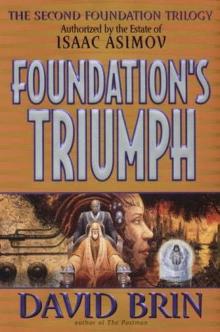 Foundation’s Triumph sf-3
Foundation’s Triumph sf-3 Thor Meets Captain America
Thor Meets Captain America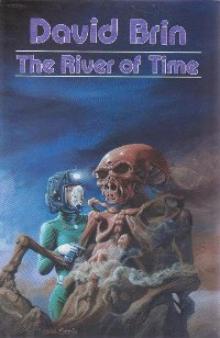 Senses Three and Six
Senses Three and Six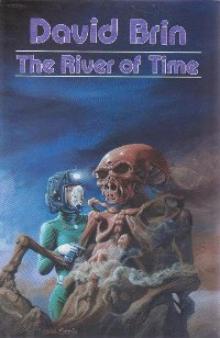 The River of Time
The River of Time Chasing Shadows: Visions of Our Coming Transparent World
Chasing Shadows: Visions of Our Coming Transparent World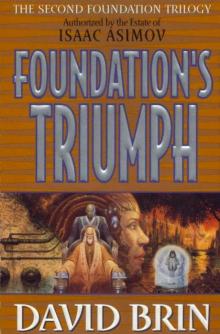 Foundation's Triumph
Foundation's Triumph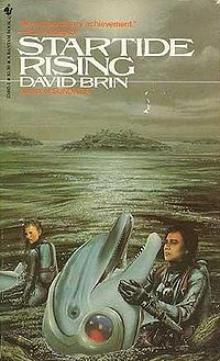 Startide Rising u-2
Startide Rising u-2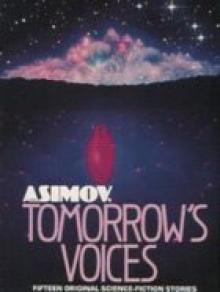 The Fourth Vocation of George Gustaf
The Fourth Vocation of George Gustaf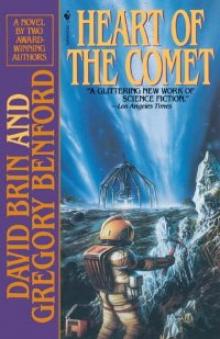 The Heart of the Comet
The Heart of the Comet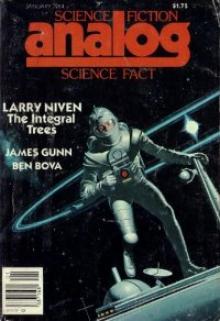 The Crystal Spheres
The Crystal Spheres